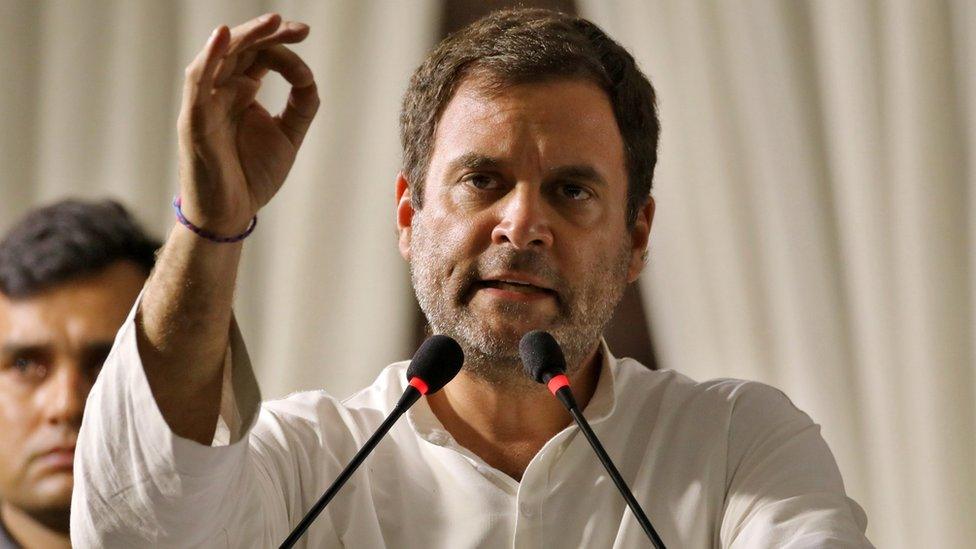Akhilesh Yadav: the new chief minister of Uttar Pradesh
- Published
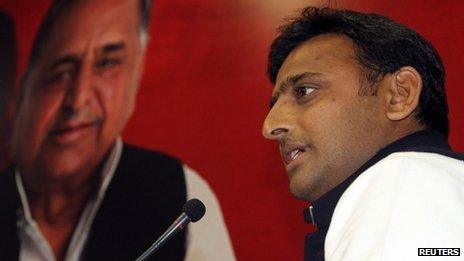
Akhilesh Yadav, the new chief minister of the politically crucial Indian state of Uttar Pradesh, is widely credited with the spectacular victory of his Samajwadi Party in the recent assembly elections.
This rock-and-roll-loving, iPhone-carrying politician is the new face of a state steeped in feudal traditions.
At 38, he is the youngest-ever chief minister of India's most populous state which, with more than 200 million people, would be the fifth-largest in the world if it was an independent country.
Mr Yadav, a three-term member of parliament, has the right pedigree - he is the eldest son of Mulayam Singh Yadav - the former wrestler-turned-politician who thrice served as the state's chief minister.
That is why Yadav junior is now being called the "Other Prince" - a comparison with Rahul Gandhi, the scion of the Nehru-Gandhi dynasty which heads India's governing Congress party.
But there was nothing princely about Mr Yadav's upbringing.
'Metallica fan'
Born on 1 July 1973 in Saifai village in Etawah district to the staunch socialist Mulayam Singh and his wife Malti Devi, Akhilesh was sent to the Sainik (military) School in Rajasthan, known for its strict discipline.
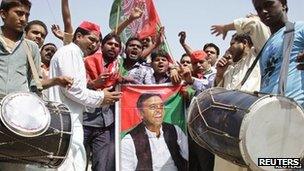
Akhilesh Yadav will have to keep his over-enthusiastic supporters in check
After getting a degree in environmental engineering from Mysore in the southern state of Karnataka, he went to Sydney, Australia, to pursue his master's.
Politics, in those days, was far from his mind - he played football, cricket and hockey, hung out with friends and listened to music - something that he still does to unwind.
In a recent interview, he counted Guns N' Roses, Bon Jovi, Bryan Adams and Metallica among his favourite musicians.
"There was no music we didn't hear. You name it, I'd have heard it," he told The Times of India's Crest.
He then went on to list some of his favourite bands and songs.
"Queen - I Want To Break Free; Rod Stewart - Some Guys Have All The Luck; Chris de Burgh; George Michael; Duran Duran; Guns N' Roses; Metallica... I still remember we used to hear Hysteria in a loop...
"Pet Shop Boys, Michael Learns To Rock, Milli Vanilli, Bon Jovi... Always came later, I remember... and Bad Medicine... Bryan Adams, Richard Marx - you remember the slow number Wherever You Go? Then there were New Kids On The Block... I remember that song Baby I Believe In You..."
Sudden rise
On the campaign trail though, it was mostly romantic Bollywood music that played on his iPhone.
Those close to him say that he is devoted to Dimple, his wife of 12 years, and a doting father to their three young children.
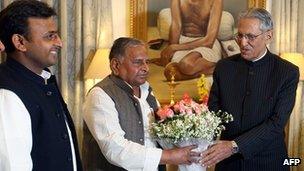
Will the Yadav family found a new dynasty in Indian politics?
They say it was the defeat of Dimple in the 2009 by-election that spurred him to revive the party in the state.
But Mr Yadav's rise to prominence has been sudden. When I went to cover his election campaign at the end of January, he told me he had already covered 250 of the state's 403 constituencies.
When the other parties were still thinking strategy, Akhilesh Yadav was traversing the length and breadth of this vast state, addressing rallies and connecting with the voters.
But until mid-February, when he suddenly became the new darling of the media, Mr Yadav and the Samajwadi Party had received little attention.
Party boss Mulayam Singh Yadav was written off as old and ill, and his "anti-English, anti-computer" stance did not appeal to the young, aspirational population of the state, one of India's poorest.
The party had been criticised for patronising criminals during its previous stints in power.
But once Yadav junior became the visible face of the party, its prospects began to change.
At his rallies, he promised free laptops and tablets to students, free electricity to weavers and jobs to the unemployed in factories which he promised the party would set up if voted to power.
He also brought computers into the party office, promised to keep the "goons" out and promised strict punishment for anyone who indulged in any criminal acts.
A novice?
Although several of the Samajwadi Party candidates have criminal cases pending against them, his refusal to nominate DP Yadav, alleged to be a gangster, went down well with the voters.
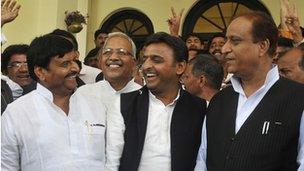
Akhilesh Yadav will have to deal with dissent within his own party
But now questions are being raised about whether he is qualified to run a state with a complex web of caste and religious politics.
Analysts point out that he is a novice when it comes to administration and that it will not be easy for him to run the bureaucracy and at the same time work on developing the state.
Also, he will have to deal with dissent within his own party. In the run up to the polls, party leaders, including Yadav junior, had insisted that Mulayam Singh would be the chief minister.
And even though Akhilesh had the backing of his father for the state's top job, the transition was far from smooth. It took all of the father's persuasive skills to convince senior party leaders to back the son.
But the biggest challenge for the new chief minister will be to rein in the party's youth cadre and its penchant for violence.
Mr Yadav has repeatedly said that "whoever does anything wrong will not be spared - even if he is a member of the Samajwadi Party".
But trouble has already begun - since the votes were counted on 6 March, there have been at least three serious instances of violence allegedly involving Samajwadi Party supporters.
How the new chief minister keeps them in check will decide the course of his government and whether it is re-elected.
- Published15 February 2012
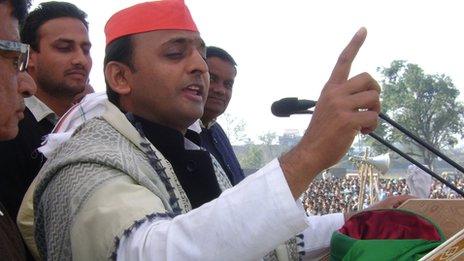
- Published6 March 2012
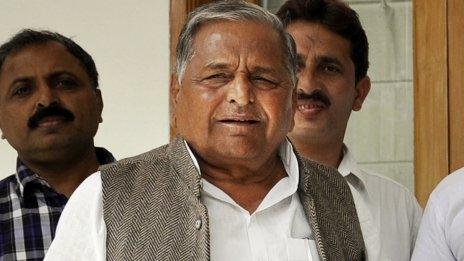
- Published6 March 2012
- Published24 May 2019
